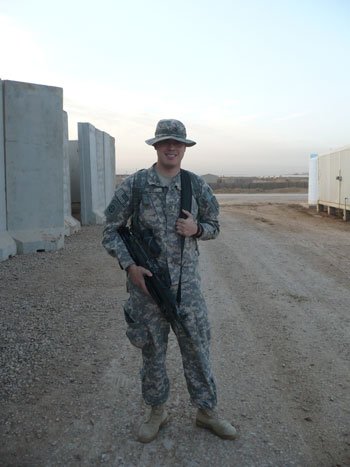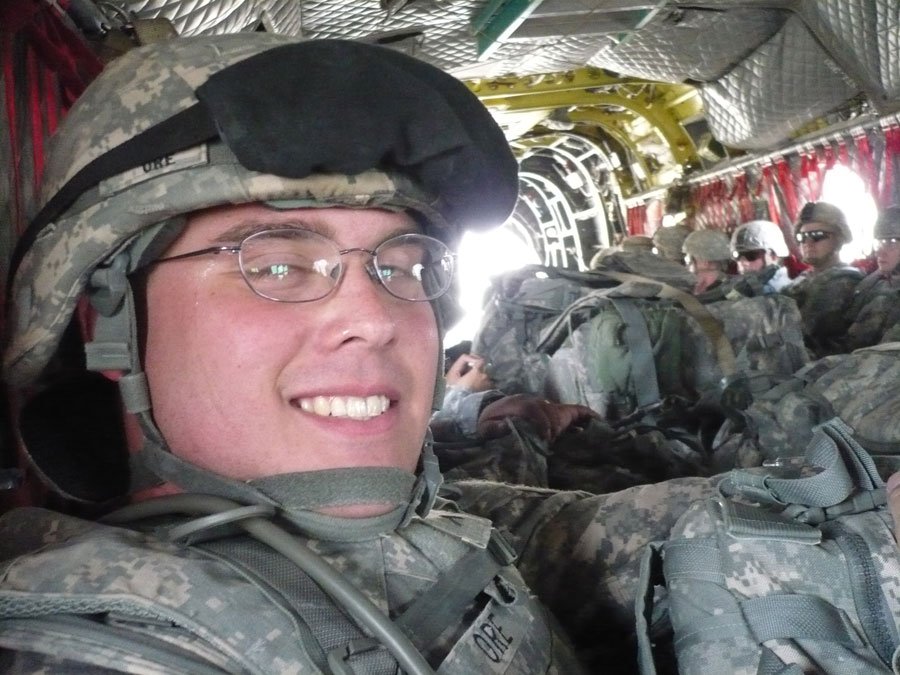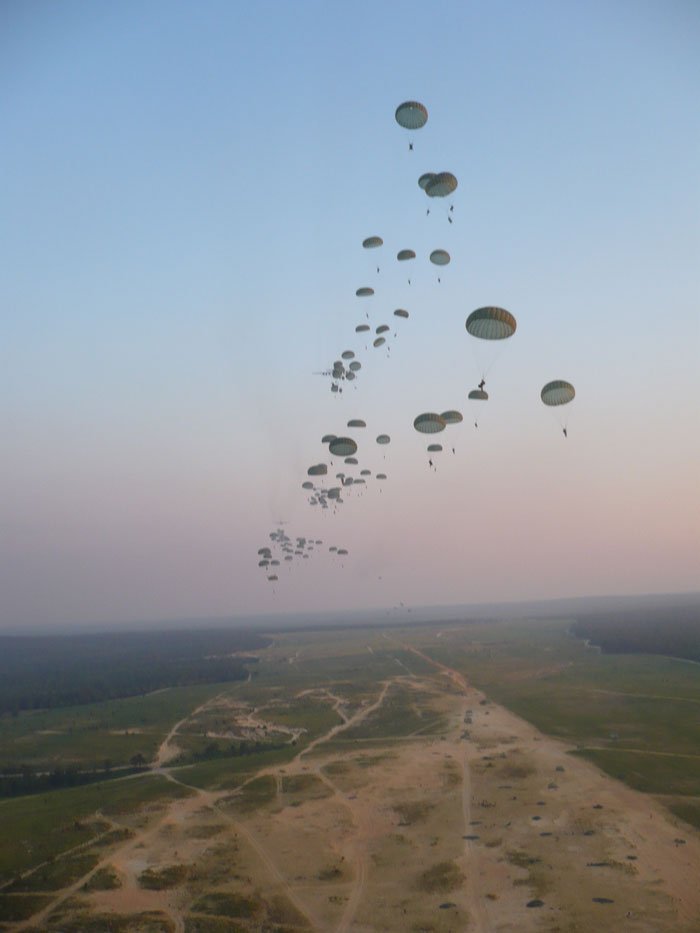When It No Longer Scares You, You Have to Quit. Fear Makes You Pay Attention.
The C-130 bounced like a rollercoaster at a cheap traveling circus. I sat on the cargo netting bench seats surrounded by first-time jumpers and pretended to sleep.
All I could think about—other than that one of these bastards was going to get me killed—was how the fuck I got here.
I’d deployed to Iraq, and I was scheduled to deploy to Afghanistan in a few months. But I couldn’t shake the feeling that this was the day something was going to go terribly wrong.
About a month before, in September 2011, a large group of Canadians arrived at Fort Liberty in North Carolina for a joint training exercise. They brought a ton of parachutes with them so that when we performed large-scale operations together, we could jump using their equipment and methods. We’d earn their jump wings as a foreign award.

Jonathan Ore during a deployment. (Photo courtesy of the author)
But the weather pissed rain almost the entire month they were with us, so most of the jumps got canceled. Not wanting to take back all the unused parachutes, the Canadians created a series of open jumps.
I’d been assigned to participate in one of them, along with two other people from our company.
The staging area that day was a madhouse, filled with multiple chalks—a line of 30 to 40 paratroopers who jump in a sequence. Eventually, the jump master began arranging the three of us into the chalks. This is an important task. If you make a mistake when you jump, you’ll probably be fine, but it could kill the paratrooper behind you. Having too many inexperienced jumpers together is especially dangerous.
As it turned out, this was a very inexperienced group.
With 14 jumps behind me—plus the five I’d performed in Jump School at Fort Moore—I was among the more seasoned paratroopers.
When the jumpmaster began surrounding me with inexperienced jumpers, I asked if he was trying to kill me.
“No,” he replied with an understanding tone. “This is the best we’ve got.”
Next, we got some quick training on how the Canadian military performs their jump commands. Notably, they throw their static lines—fixed cords attached to the plane that automatically open the parachutes.
After taking my seat in a tightly packed C-130, I noticed some of the troops were visibly shaking, reminding me again of their inexperience.
In the airborne community, we say, “When it no longer scares you, you have to quit.”
Fear makes you pay attention. And when you’re jumping out of a plane, there are lots of things to pay attention to. But too much fear is also a problem.
As a more experienced paratrooper, I figured it was my job to give them the impression I was unfazed. I told the guy next to me to wake me up when we got there and pretended to fall asleep.
But my heart was racing.
At last, the doors to the plane opened. The jumpmaster grabbed the doorway and leaned out. We worked through the commands and checks.
“Go, go, go!” shouted the jumpmaster.
We started moving forward. Paratroopers threw their static lines and exited the side door. When it was my turn, I pulled together all of my strength, wound up, and threw the static line as hard as I could.
The static line shot back as it should. I made a 90-degree left face to walk out the door and ran into the jumper in front of me. I’d been so focused on throwing the static line I hadn’t seen him freeze in the doorway.

Jonathan Ore’s military career ended abruptly after he was severely injured during a jump. (Photo courtesy of the author)
The force of the impact sent him out the door, and he made a clean exit. I landed on the floor, half in the plane and half out, stuck. The prop blast hitting me in the face made it hard to breathe.
Award-Winning Journalism in Your Inbox
After what felt like a week but was probably no more than a second, someone shoved me out the door. I slid across the skin of the plane. The chute opened, causing me to do a flip. My helmet was ripped off my head.
At this point, training kicked in. I looked up. My chute had a “cigarette roll,” meaning it was not inflating but instead acting like a streamer in the wind. I grabbed the risers that connected me to the chute and yanked them apart, trying to get the chute to inflate.
It finally inflated, and I started to slow down. Next, I tried to find a nice place to land. But I’d run out of time. I was about to hit the ground.
I felt a rush of pain. Then nothingness.
When I came to, I realized my chute was starting to inflate to drag me across the drop zone. I popped a riser to deflate it. I wiggled my toes and tried to get an idea of the damage. My back seemed out of commission, but the screaming pain assured me I was not paralyzed.
Somewhere out of sight, a friend from my chalk hit the ground next to my helmet and knew right away something was wrong. He set off running. After cresting a small hill, he found me and shouted for a medic.
They appeared in a Humvee, and three things went through my head. First: If I was driven off the drop zone, I probably wouldn’t get my Canadian Jump Wings, and this would be all for naught. Second: If I could walk off the drop zone, it would still be considered a “good” jump. Third: The bumpy ride in the Humvee might very well finish me off.
In the most polite and diplomatic way I could muster, I informed them I would prefer to walk. This came out as a long line of swear words and threats.
“Fine then. Let’s see you stand up,” a medic said.
“Fuck you,” I said, and with a lot of help, got to my feet.
The medics pulled up my shirt to have a look at my back. “Well, no bones are poking out, so if you want to walk off the drop zone, we won’t stop you.”
I was helped back into my equipment—about 50 pounds of it. Pain exploded again in my back, and I nearly passed out a second time.

A photo from Jonathan Ore’s seventh jump. (Photo courtesy of the author)
No one ever walks off a drop zone. They run. I watched the others with envy and walked as fast as I could, expecting to get screamed at.
“The turn-in point is just over there,” a first sergeant said calmly. “You got this. You’re almost there.” I realized then I must really be hurt.
I did my best to stand up straight in formation to accept my Canadian Jump Wings from a colonel who pinned them to my chest.
Next came a major working the line. By now, I’d lost my military bearing.
“How was your jump?” the major asked, shaking my hand.
“I walked off the drop zone, sir,” I said through clenched teeth.
He took a second look. “Damn, how long have you been Airborne?”
“Too long, sir.”
A few hours later, my chief warrant officer found me on my back with my legs on a chair at the office.
“You’re not going to sick call tomorrow, are you? I need you to clear an arms room at 0700.”
Over the next three months, as we prepared to deploy to Afghanistan, I never fell out of a ruck march or running formation. Occasionally, I did go to sick call if I lost feeling in my legs after a particularly bad physical training session. Each time, a doctor told me to change my socks, drink water, and take a handful of 800 mg Motrin.
Then, on a whim, a physician’s assistant told me to get an X-ray.
I was now a squad leader in charge of a group of young, inexperienced privates training six days a week. I didn’t have time for this. Finally, I went.
I was at work when I got a call from the PA, who wanted to discuss the results.
“Do you want to hear it over the phone?” she asked in a concerned tone.
“What the hell does that mean?” I shouted. “Do I have hours to live or something?”
“OK. You have a compressed L2 vertebra,” she said.
“What the hell does that mean?”
“You have severe spinal cord damage. If you had another jump, you would have been killed. You are not only no longer deployable, but you will be refused reenlistment.”
Our Journalism Depends on Your Support
That I understood. We talked a bit longer, but I didn’t hear anything else.
Over the next two days, we worked out what to do with my squadron—they’d be broken up and shared with all the companies. I was to spend my last three weeks in the Army working at a gym.
I felt abandoned and betrayed. That I’d failed my guys, my unit, and my military.
All these years later, I know I would have been a liability, that the military did what they had to. I still have days when I wake up unable to move one leg or both. But it is one more day I wouldn’t have had if I’d pushed myself any harder, and I am grateful for that.
This War Horse reflection was written by Jonathan Ore, edited by Kristin Davis, fact-checked by Jess Rohan, and copy-edited by Mitchell Hansen-Dewar. Abbie Bennett wrote the headlines.





Comments are closed.